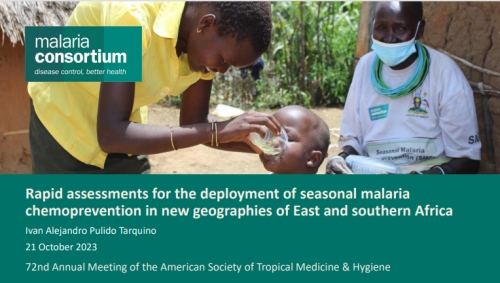
Publication Date:
21/10/2023
Author:
Ivan Alejandro Pulido Tarquino
Type:
Presentation

Rapid assessments for the deployment of seasonal malaria chemoprevention in new geographies of East and southern Africa
Publication Date:21/10/2023
Author:
Ivan Alejandro Pulido Tarquino
Type:
Presentation
A rapid assessment will estimate the effectiveness, chemoprevention efficacy, potential deployment impact, acceptability and feasibility of seasonal malaria chemoprevention using SPAQ in new geographies within East and southern Africa.
Seasonal malaria chemoprevention (SMC) with sulfadoxine-pyrimethamine (SP) and amodiaquine (AQ) is a highly effective community-based intervention to prevent malaria caused by Plasmodium falciparum. Updated malaria chemoprevention recommendations no longer include geographic restrictions and allow more flexibility in recognising age-based risk among children. The guidelines could enable SMC in previously untreated areas of East and southern Africa with seasonal malaria transmission patterns.
Particularities of East and southern Africa include potentially high resistance profiles, malaria transmission and prevalence, population immunity and efficacy of SPAQ. Malaria Consortium plans to conduct rapid assessments in new geographies of East and southern Africa over the next two years to inform decisions about the potential scale-up of the intervention in those locations.
This presentation was given at the 72nd annual meeting of the American Society of Tropical Medicine and Hygiene.
Country: Mozambique
Keywords: ASTMH | Chemoprevention | Malaria | Research | SDGs | SMC
« Back to Publications